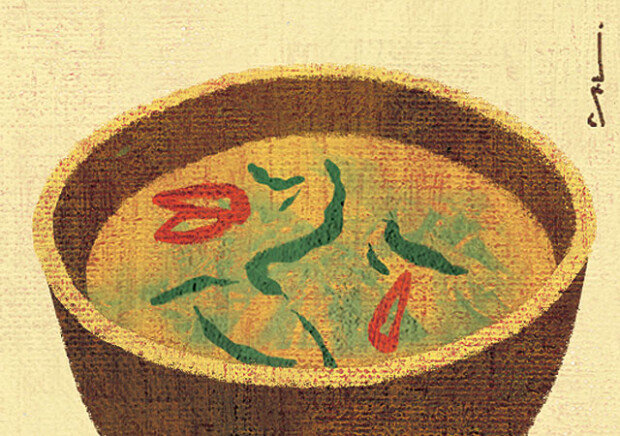Siraegi soup
Siraegi soup
Posted December. 08, 2018 07:38,
Updated December. 08, 2018 07:38

It is difficult see siraegi (dried radish green) in the city these days, but it was very common at every household in the past. People would cut radish root to eat, and tied up together the stems and green leaves and hanged them on the eaves. Siraegi would be a useful foodstuff throughout the winter season or even until the spring. My mother would soak it in water and smash siraegi with seasonings as if she was washing clothes to make various side dishes. She would put it into a doenjang (soybean paste) stew or beef soup, or make boiled herbs seasoned with perilla oil.
Among various such dishes, this poem describes siraegi guk (soup). The poet feels hungry mentally rather than physically due to an empty stomach. To fill her emotional hunger, the poet takes on a journey in search of her warmest memories. Her grandmother would cook siraegi guk for her when she was a child, and a recipe that the poet considers to be the happiest food. The poet picked this food to fill her emotional stomach rather than physical stomach. While eating siraegi guk, the poet meets with her own grandmother, daughter, and hometown. Rather, it may be more accurate to say that she is eating siraegi guk to meet with her grandmother and daughter. As such, it is okay that "siraegi" that appears in this poem is not actually siraegi. It could be a radish soup to some, noodles or udon to others.
As the temperatures plunged, a bowl of warm and hot soup naturally comes to my mind. When we feel sick amid freezing temperatures or feel sad after the year-end season, we will come to crave for hot soup all the more. Feeling relieved while sipping hot soup through the throat, we may recall our hometown, past love, parents or friends. Then, the very food that reminds you likewise is your soul food. Soul food is different for different individuals, but it is always there and we always need it.
Headline News
- Joint investigation headquarters asks Yoon to appear at the investigation office
- KDIC colonel: Cable ties and hoods to control NEC staff were prepared
- Results of real estate development diverged by accessibility to Gangnam
- New budget proposal reflecting Trump’s demand rejected
- Son Heung-min scores winning corner kick







